No, potatoes are not high in histamine, generally speaking. However, there are some potential concerns with potato histamine levels, depending on how these delicious spuds are prepared and whether you have food allergies or histamine intolerance.
Let’s dive into the relationship between potatoes and histamine so you can make an informed choice about your diet and overall well-being.
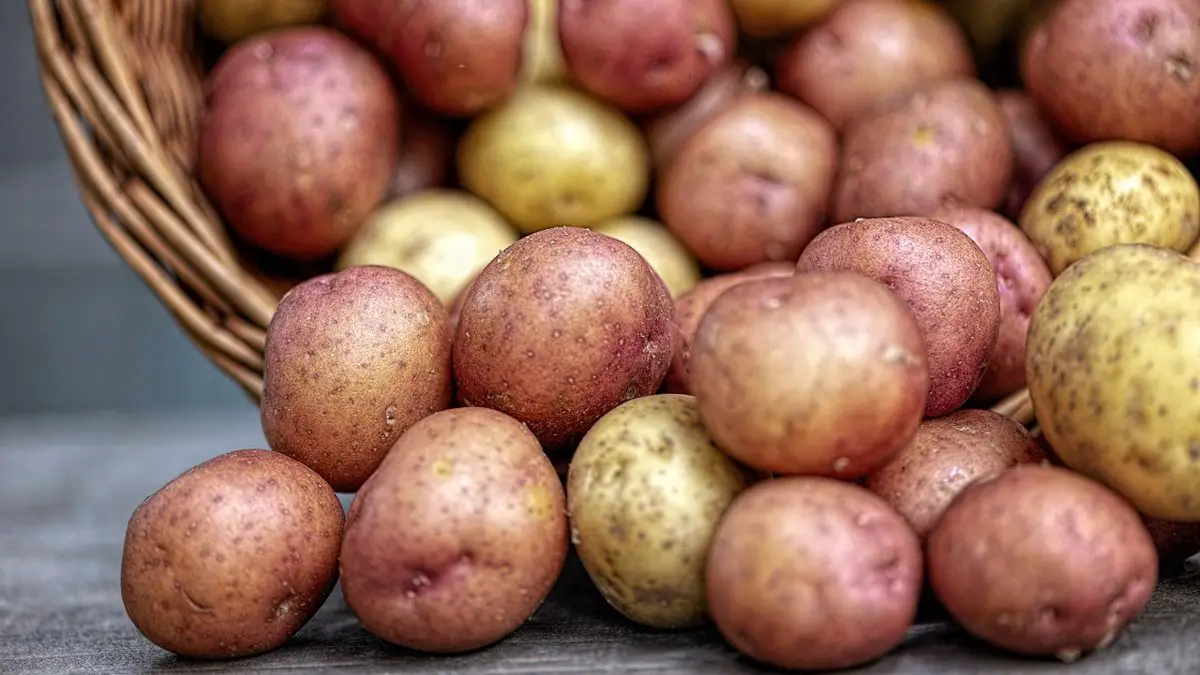
Table of Contents
Do Potatoes Have Any Histamine?

Potatoes have histamines but are considered a low-histamine food. Histamine levels in potatoes fluctuate depending on the potato preparation method. Foods that are fried tend to have higher histamine levels, while boiled foods tend to have the same or lower histamine levels.
Potatoes have low histamine levels, regardless of the potato type (yellow/gold, red, purple, white, sweet, or russet). Even with a low histamine level, you can still experience a potato allergy.
Are Potatoes Considered Nightshades?
Yes, all potatoes are from the Solanum tuberosum plant and are considered nightshades (except sweet potatoes). The nightshade family includes tomatoes, potatoes, eggplant, and peppers.
While these vegetables are all safe to eat in moderation, they can cause problems for some people if consumed in large quantities, or if you have a potato intolerance. If you have any questions about whether a particular food is a nightshade plant or not, ask your doctor for advice.
Are Sweet Potatoes High in Histamine?
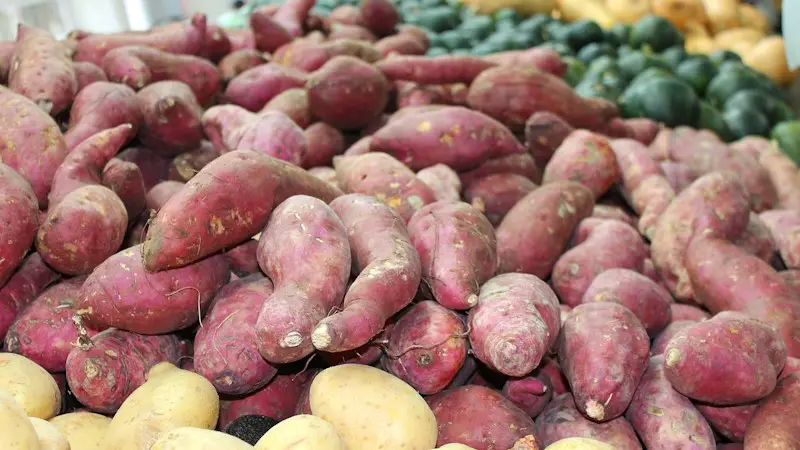
No, sweet potatoes are not high in histamine, they are a low-histamine food. Since sweet potatoes have low histamine levels, this makes them a great food to incorporate into a low histamine diet.
However, some people may be sensitive to even low potato histamine levels. If you experience symptoms after eating potatoes, you may want to avoid them or cook them in a way that reduces their histamine content. You can also try taking antihistamines to help manage your symptoms.
Canned Sweet Potatoes Histamine Levels
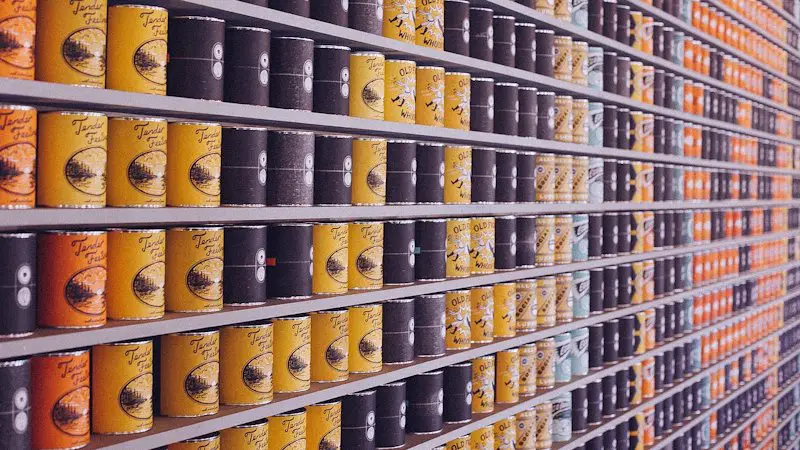
Sweet potatoes in their raw form are low-histamine, generally speaking, canned sweet potatoes still fit in the low-histamine category.
A study conducted to test the effects of storage temperatures of canned foods (fruits and syrups) reveals that cans stored at higher temperatures can increase the histamine levels in certain foods.
This means that the canned sweet potatoes (low histamine) should remain low histamine as long as the cans are stored properly.
Keep in mind, that this study was not conducted on canned sweet potatoes specifically. Until a study on canned sweet potatoes is conducted, we cannot know for sure.
Are Sweet Potatoes Considered Nightshades?
No, sweet potatoes are not nightshades, as they do not contain nightshade alkaloids. A general recommendation by medical professionals is to switch from regular potatoes to sweet potatoes if nightshades are a concern.
Are Sweet Potatoes, Potatoes?
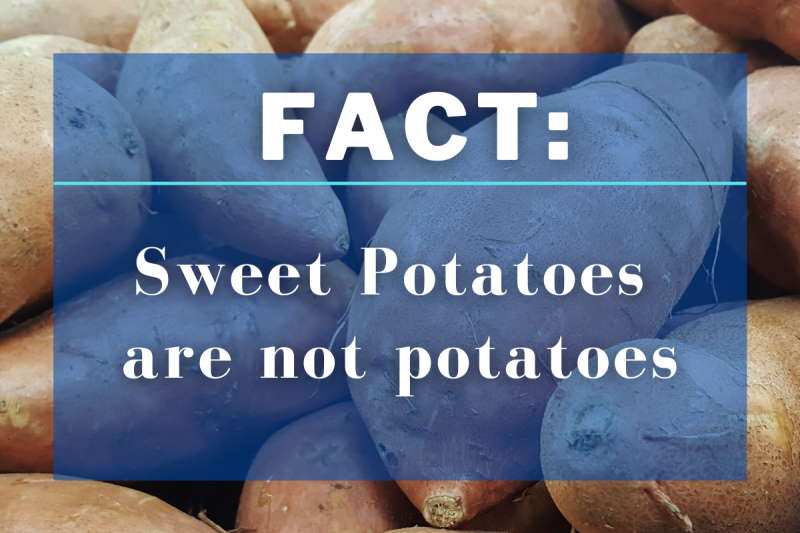
No. Sweet potatoes are not potatoes, even though “potato” is in the name. Sweet Potato plants are from the Convolvulaceae family and are considered root vegetables. Potatoes are considered tubers, the two potatoes are not related.
Are Potato Chips Low in Histamine?
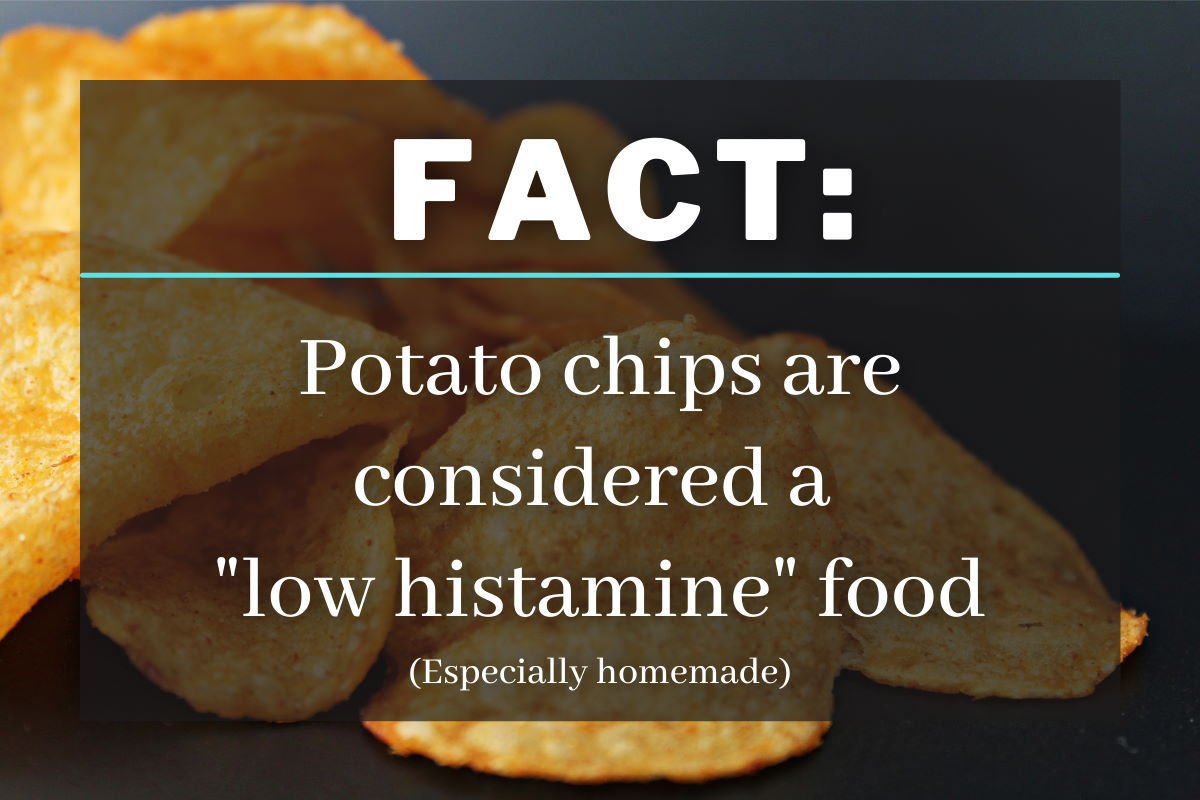
Yes, potato chips are usually low in histamine. But, the histamine content of a potato chip can change depending on how the potatoes are processed as well as what seasonings are added to the chips. Look for chips with simple ingredients with limited seasonings to keep the potato histamine levels low.
Low Histamine Potato Chips Qualities
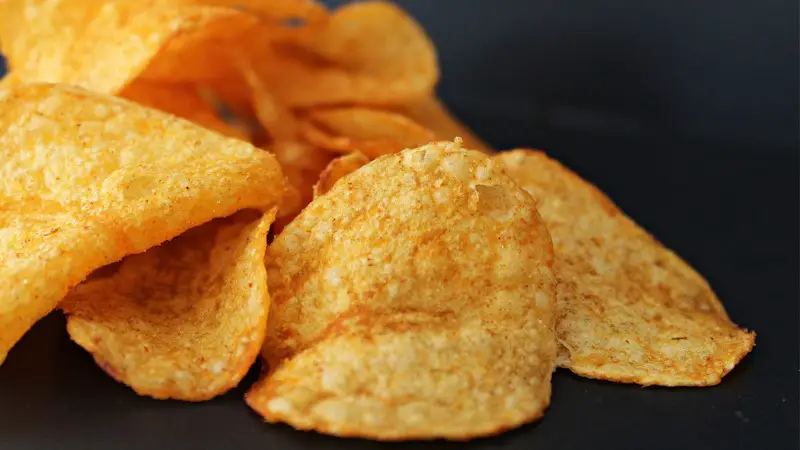
The quality of the potato chip can affect the overall histamine levels. Here are some low histamine potato chip qualities to look for:
- Freshly Made: Opt for potato chips that are freshly made or have a shorter shelf life.
- Simple Ingredients: Choose potato chips with minimal ingredients. Avoid those containing additives, preservatives, artificial flavors, or artificial colors.
- Organic or Locally Sourced Potatoes: Organic potatoes or those sourced locally are less likely to have been exposed to pesticides, which can trigger histamine reactions in some individuals.
- Low Histamine Cooking Oil: Look for chips cooked in oils that are low in histamine, such as sunflower oil, safflower oil, or avocado oil. Avoid chips cooked in high histamine oils like soybean oil or canola oil.
- Freshly Sliced Potatoes: Chips made from freshly sliced potatoes are generally better than pre-packaged ones, as they have a lower chance of histamine accumulation.
- Limited Seasonings: Opt for potato chips with minimal seasonings. Common flavorings like salt, pepper, or herbs are usually safe but avoid chips with artificial flavorings or complex spice blends that may contain hidden sources of histamine.
- Vacuum-Sealed Packaging: Chips that come in vacuum-sealed packaging have less exposure to air and are less likely to accumulate histamine during storage.
- Allergen-Free Facility: If you have specific allergies or sensitivities, look for potato chips produced in a facility that is free from common allergens, such as wheat, dairy, or nuts, to minimize the risk of cross-contamination.
- Transparent Labeling: Choose potato chips with clear and detailed ingredient labels. This helps you identify any potential histamine triggers or allergens present in the product.
- Freshness Guarantee: Select brands that offer a freshness guarantee or have a reputation for maintaining high-quality standards. This ensures that you are purchasing chips that are less likely to have high histamine levels.
Are French Fries High in Histamine?
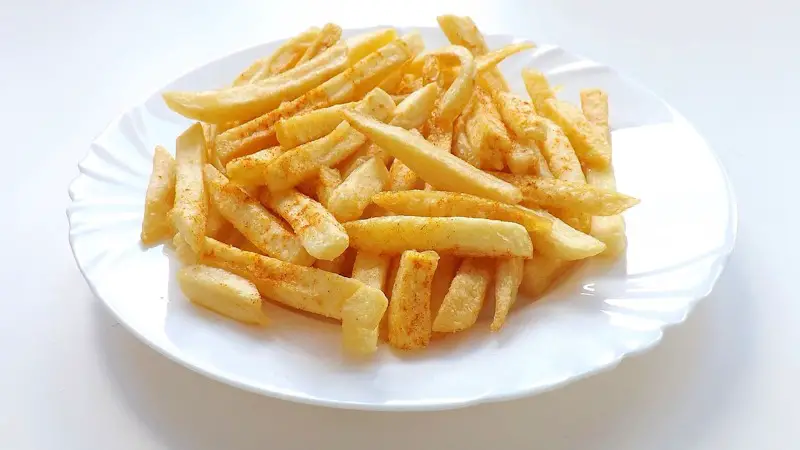
No, french fries tend to have low histamine concentrations, but it depends on how the potatoes are handled, processed, and cooked. Here are some traits that tend to increase french fry histamine levels:
- Cooking “low and slow”
- Exposure to air after being cut
- Fried in a high histamine oil
- Improper storage
- Using old potatoes
The best way to enjoy french fries that will not be high in histamine is homemade. Use fresh local potatoes, cook on high heat, and use a quality low-histamine oil like avocado oil.
Are Baked Potatoes High in Histamine?
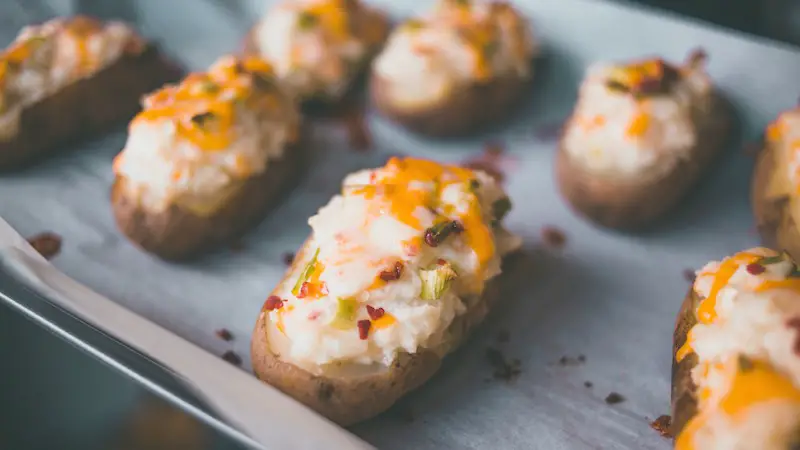
No, plain baked potatoes are not high in histamine. Ensure you are using a fresh potato and baking it at a higher temperature will limit any significant histamine production, thus keeping histamine levels low. Additionally, a potato that is not stored properly, or is not fresh can raise the histamine levels.
Are Instant Potatoes High in Histamine?
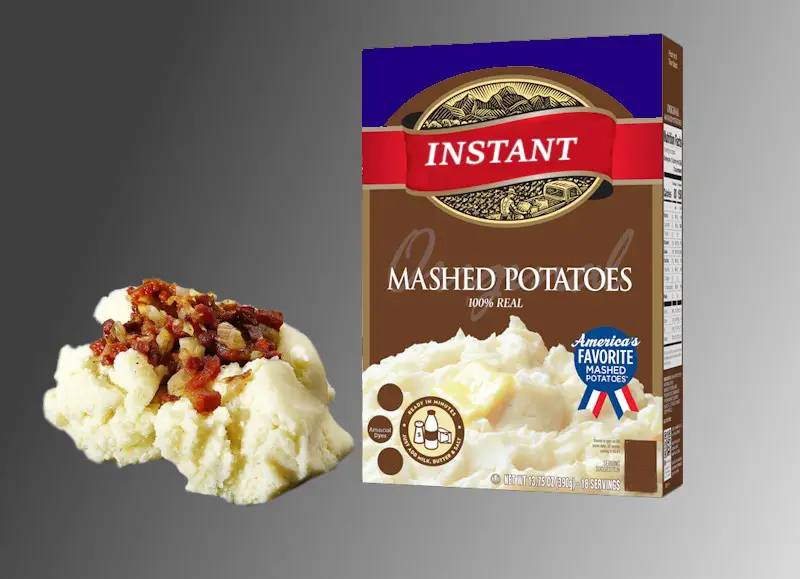
Most likely. Instant potatoes have the potential to be high in histamine. Fresh potatoes are low in histamine, but when they go through the dehydration process to become instant potatoes, things can get a little tricky. This process has the potential to crank up the histamine levels.
For the potato flakes to become shelf-stable, there are usually preservatives that need to be added to the potatoes. Additionally, many instant potato options are flavored with natural and artificial flavors which could potentially increase histamine levels as well.
Unfortunately, there is not any specific data available on instant potato histamine levels, but it may be best to avoid potato flakes while on a low-histamine diet.
Histamines In Foods

All foods vary in histamine levels, and there is no way to avoid all histamines. Foods that you are unable to tolerate, might not be an issue for someone else.
We all have different histamine intolerance levels, so remember to listen to your body. Eating a healthy diet of low-histamine foods, and avoiding those considered high-histamine is a great way to manage your diet.
I arranged the following examples from Histamine Intolerance Awareness.
Lower Histamine Food Examples
Here is a list of foods that are generally known to have low histamine levels:
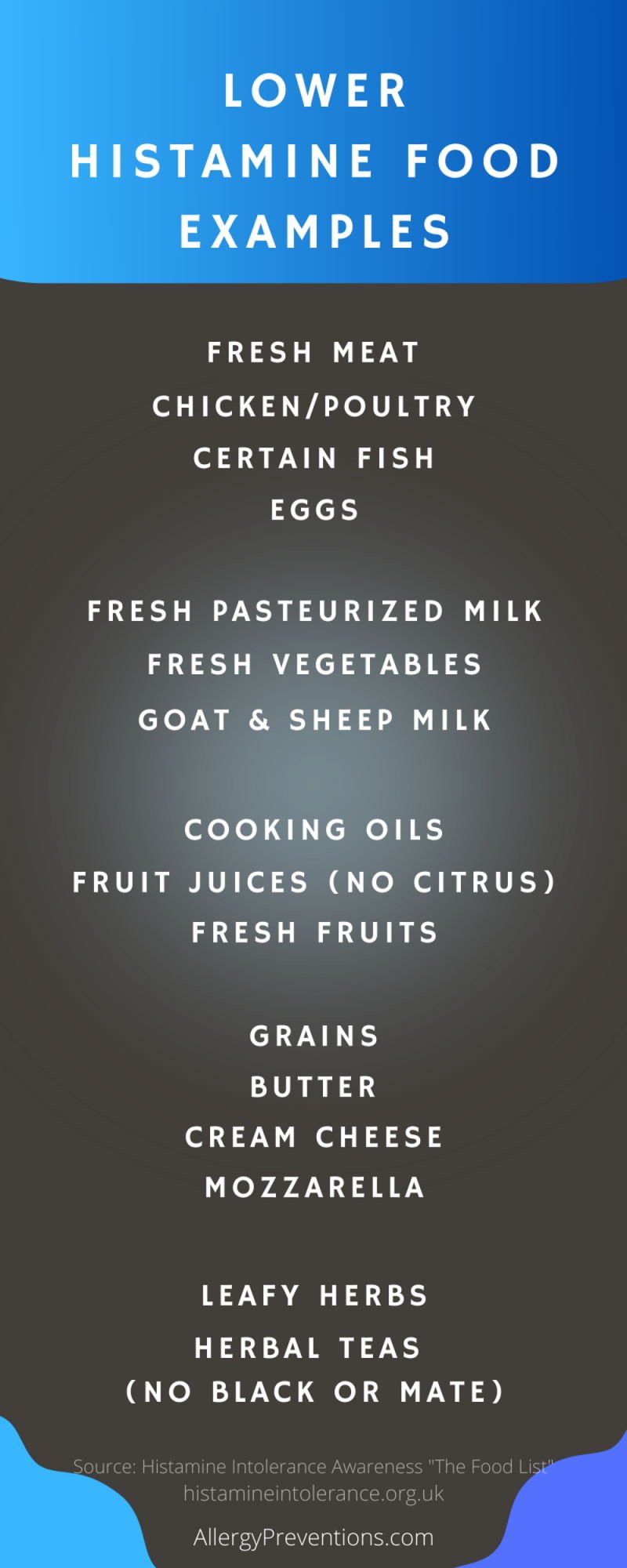
- Certain fresh/frozen fish – hake, trout, plaice
- Chicken/poultry
- Cream cheese, mozzarella, butter (without the histamine generating rancidity)
- Eggs
- Fresh fruits – (excluding plantains)
- Fresh meats
- Fresh vegetables – (excluding tomatoes, eggplant, and spinach)
- Fruit juices – (excluding citrus fruits)
- Grains – also products thereof such as noodles, bread, oats, crackers, flour, pasta
- Herbal teas – (excluding black & mate tea)
- Leafy herbs – check suitability before use
- Milk
- Milk substitutes – goat milk, sheep milk
Higher Histamine Food Examples
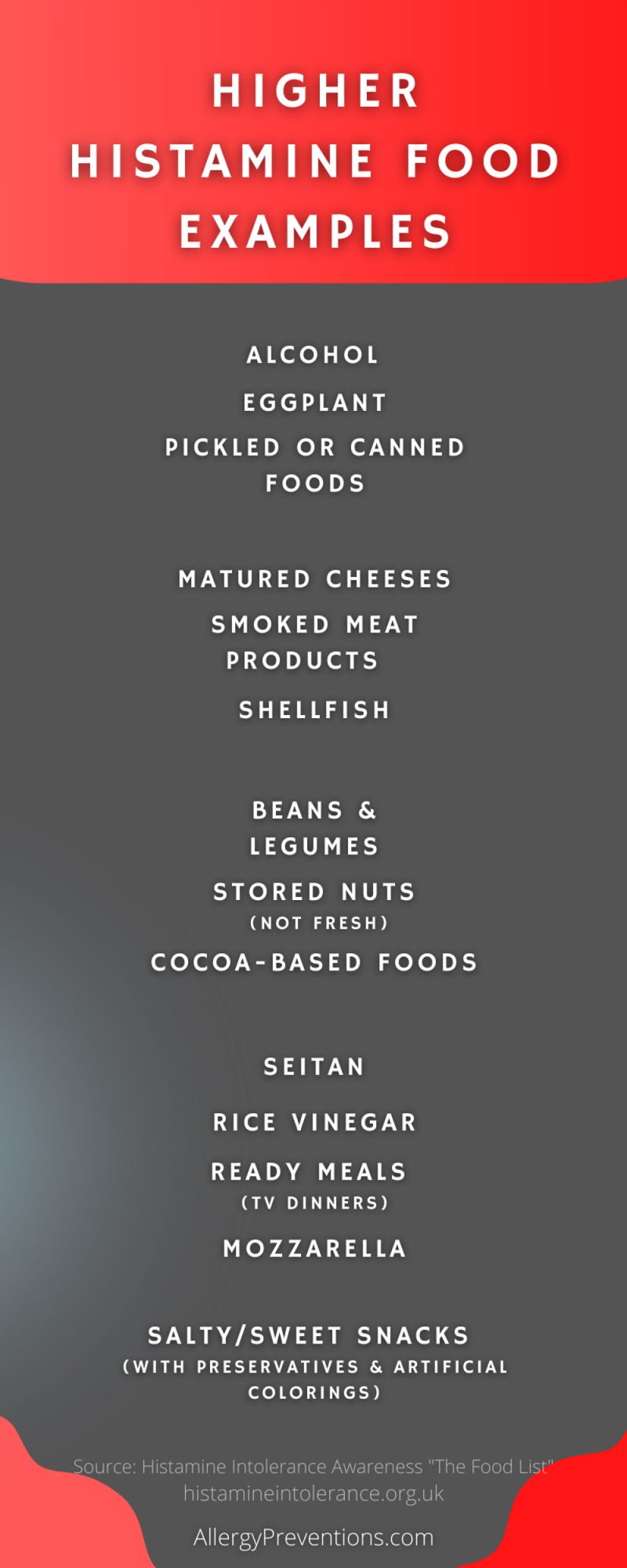
Here is a list of foods that are generally known to have higher histamine levels:
- Alcohol
- Beans and legumes
- Eggplant
- Chocolates and other cocoa-based products
- Long-stored nuts – e.g peanuts, cashew nuts, almonds, pistachios
- Matured cheeses
- Pickled or canned foods, sauerkrauts
- Ready meals
- Rice vinegar
- Salty snacks, sweets with preservatives, and artificial colorings
- Seitan
- Shellfish
- Smoked meat products, salami, ham, sausages
Consuming a fresh and wholesome diet can go far with lowering your histamine exposure through your foods. Consider starting a food diary, and talking with your doctor or dietician to discover your body’s specific needs.
Potato Histamine FAQs
Here are some of the most frequently asked potato histamine food questions.
Are potatoes high in histamine?
No, potatoes are considered a low-histamine food.
Are potatoes low in histamine?
Yes, potatoes are low in histamine and generally recommended to be included in a low-histamine diet.
Are potato chips low in histamine?
Yes, potato chips are considered low-histamine, but since potato chips are fried, they do have higher histamine levels. For example, a baked potato will have lower histamine levels than a potato chip.
Are potato chips high in histamine?
No, potato chips are a low-histamine food, but because the chips are fried, they have a higher level of histamine compared to baked or boiled potatoes.
Do potatoes have histamine?
Yes, potatoes contain a low level of histamines.
Do histamine levels in foods matter?
Yes, histamine can cause inflammation and allergic reactions.
What happens if I have a food allergy but keep eating those foods?
Continuing to eat foods you have an allergy to can result in worsening allergy symptoms that could become life-threatening.

